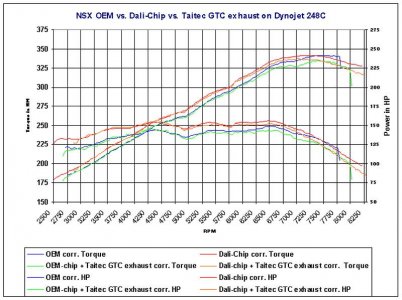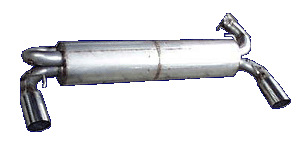Today, I had my car dynoed with both the OEM-chip and the Dali-chip. Differnce is, I now have the Taitec GTC exhaust mounted on the car instead of the OEM one.
The Taitec exhaust weighs 25.1 lbs versus the OEM 43.4. The weight saving is therefore equal to almost 1.6 HP.
It was a hot day today overhere, temperature at time of dynoing was 90 degrees Fahrenheit (32.2 degrees Celsius). The original Dali-chip was done at 73 Fahrenheit (22.5 Celsius).
Overall, the results were disappointing. I had expected a slight gain in HP with both the OEM and Dali-chip. The results however, were just the opposite. instead, the Taitec-exhaust gave lower readings.
In the end, the corrected results show me this.
First column is always corrected torque, second one is corrected HP.
OEM Chip
Average 236.7 175.5
Maximum 248.7 241.6
Dali-chip
Average 184.9 241.9
Maximum 247.8 256.0
OEM chip with Taitec GTC exhaust
Average 232.5 173.6
Maximum 245.6 234.7
Dali-chip with Taitec GTC exhaust
Average 239.8 184.8
Maximum 254.8 237.3
As can be seen, the Taitec corrected results are consistently lower than the results with the OEM-exhaust. On average, they sum up like this:
Difference in % Taitec GTC versus OEM exhaust
OEM Nm OEM HP Dali Nm Dali HP
Average -1.1% -1.1% -1.0% -1.0%
Maximum 2.2% 2.1% 0.9% 0.9%
If there were any measurable gains, it was only in the 2700-2900 rpm range where the Taitec GTC exhaust measured a very tiny little bit better, like 1 HP and 1 Nm. Above 2900 rpm both torque and HP was consistently lower than with the OEM-exhaust.
I do not know if the Dynojet correct results also correct for temperature differences. So far, the expense of putting in the Dali-chip has been much more worthwhile than the addition of the Taitec GTC exhaust although the latter sounds a bit more impressive.
A graph of the measured results is given below. One thing I noticed is that the lines of the Taitec-exhaust are more 'shaky' than those with the OEM-exhaust. For this, I have no explanation. The Dynojet used is the same, only a different guy doing the runs for me.
The Taitec exhaust weighs 25.1 lbs versus the OEM 43.4. The weight saving is therefore equal to almost 1.6 HP.
It was a hot day today overhere, temperature at time of dynoing was 90 degrees Fahrenheit (32.2 degrees Celsius). The original Dali-chip was done at 73 Fahrenheit (22.5 Celsius).
Overall, the results were disappointing. I had expected a slight gain in HP with both the OEM and Dali-chip. The results however, were just the opposite. instead, the Taitec-exhaust gave lower readings.
In the end, the corrected results show me this.
First column is always corrected torque, second one is corrected HP.
OEM Chip
Average 236.7 175.5
Maximum 248.7 241.6
Dali-chip
Average 184.9 241.9
Maximum 247.8 256.0
OEM chip with Taitec GTC exhaust
Average 232.5 173.6
Maximum 245.6 234.7
Dali-chip with Taitec GTC exhaust
Average 239.8 184.8
Maximum 254.8 237.3
As can be seen, the Taitec corrected results are consistently lower than the results with the OEM-exhaust. On average, they sum up like this:
Difference in % Taitec GTC versus OEM exhaust
OEM Nm OEM HP Dali Nm Dali HP
Average -1.1% -1.1% -1.0% -1.0%
Maximum 2.2% 2.1% 0.9% 0.9%
If there were any measurable gains, it was only in the 2700-2900 rpm range where the Taitec GTC exhaust measured a very tiny little bit better, like 1 HP and 1 Nm. Above 2900 rpm both torque and HP was consistently lower than with the OEM-exhaust.
I do not know if the Dynojet correct results also correct for temperature differences. So far, the expense of putting in the Dali-chip has been much more worthwhile than the addition of the Taitec GTC exhaust although the latter sounds a bit more impressive.
A graph of the measured results is given below. One thing I noticed is that the lines of the Taitec-exhaust are more 'shaky' than those with the OEM-exhaust. For this, I have no explanation. The Dynojet used is the same, only a different guy doing the runs for me.






